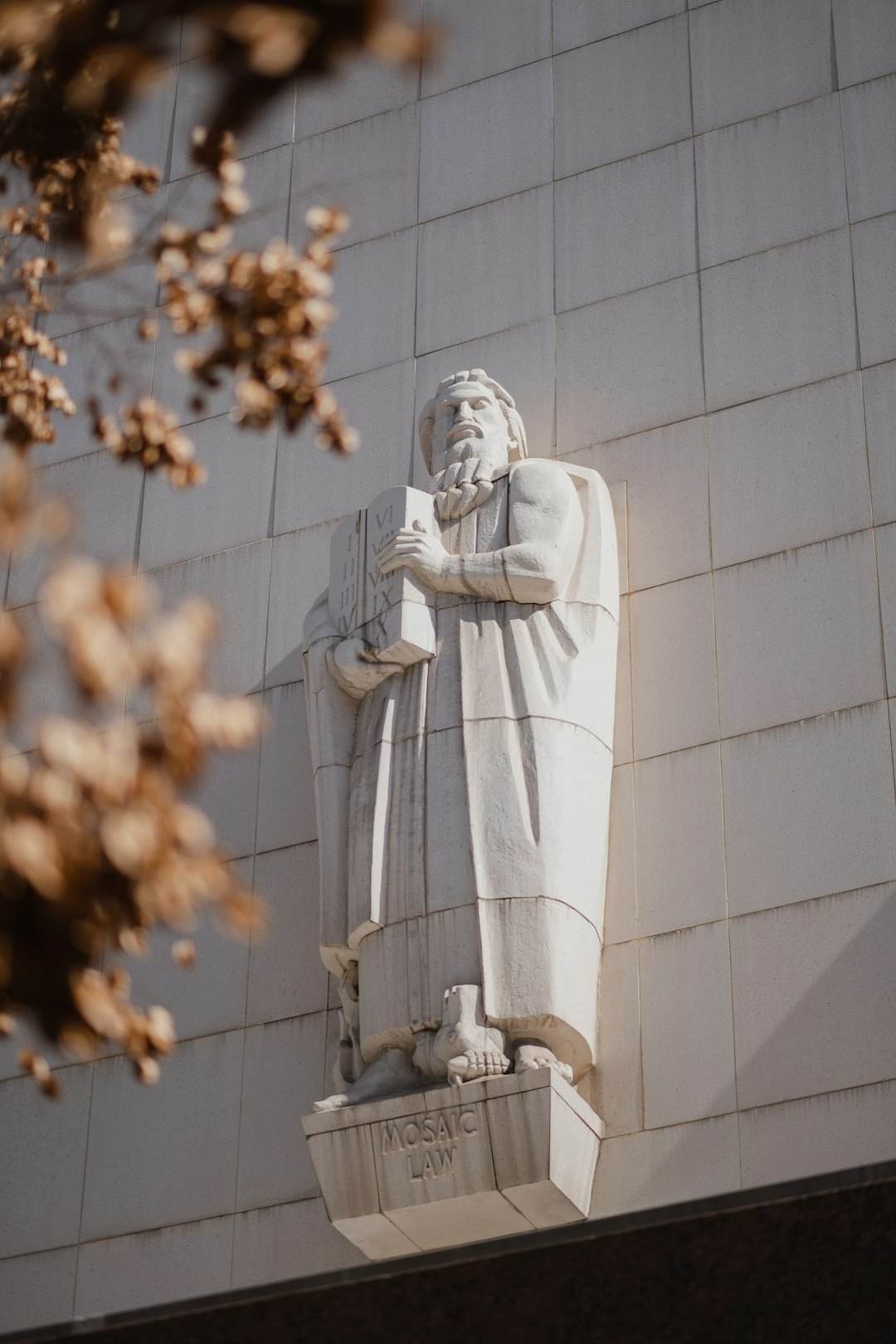An Exploration of Galatians: Why have the Law?
Galatians 3:19-22 - The Law points out our need for salvation. Christ is the mediator who fulfills the law and frees us through our faith in Him

“Why the Law then? It was added because of transgressions, having been ordained through angels by the agency of a mediator, until the seed would come to whom the promise had been made. Now a mediator is not for one party only; whereas God is only one. Is the Law then contrary to the promises of God? May it never be! For if a law had been given which was able to impart life, then righteousness would indeed have been based on law. But the Scripture has shut up everyone under sin, so that the promise by faith in Jesus Christ might be given to those who believe.”
Galatians 3:19-22 NASB1995
I used the photo inserted above in the body of the text of my last devotional. I thought it was so appropriate that I made it the introduction photo in this devotional that examines Galatians 3:19-22. Paul is explaining why we had the Law. I have to confess something: I found most or all of this passage to be quite difficult to understand, even by Paul’s standards of incomprehensible profundity (don’t get me wrong - I LOVE Paul and his epistles, but a casual reader is probably going to be scratching their head when reading many of his precepts). It took quite a bit of research to try and understand it, but I think I get the basic gist of the matter, in that the Law was given to humans because of our transgressions. Fortunately, Enduring Word has some splendid commentary for the first two verses:
What purpose then does the law serve? It was added because of transgressions: Part of the reason the law was given was to restrain the transgression of men through clearly revealing God’s holy standard. God had to give us His standard so we would not destroy ourselves before the Messiah came. But the law is also added because of transgressions in another way; the law also excites man’s innate rebellion through revealing a standard, showing us more clearly our need for salvation in Jesus (Romans 7:5-8).
Till the Seed should come to whom the promise was made: So as the Law was meant to prepare us for the work of the Messiah, it was given till the Seed (Jesus) should come. It isn’t that the Law of Moses is revoked when Jesus came (Jesus said that He came to fulfill the Law, not destroy it in Matthew 5:17). Instead, the Law of Moses is no longer our ground of approaching God.
It was appointed through angels by the hand of a mediator: According to ancient traditions – true traditions, according to Paul – the Law was delivered to Moses on Mount Sinai by the hands of angels. Angels were the “go-between” or mediator for Moses when he received the Law from God.
I love this simple, yet elegant commentary. The Law was first given to restrain the transgressions of humans by revealing an impossible holy standard. God did not want us to destroy ourselves before the Messiah came. Jesus, the Messiah, came to fulfill the Law and be our mediator. But the Law was also added because that holy standard excites that natural rebellion that every human is equipped with, showing clearly our need for salvation. Precept Austin has two short illustrations on how the law provokes unlawful behavior:
In Galveston, Texas, a hotel on the shore of the Gulf of Mexico put this notice in each room - "No Fishing From the Balcony" Yet every day, hotel guests threw in their lines to the waters below. Then the management decided to take down the signs--and the fishing stopped! The Law shows sin and stimulates sin!
Did the Prohibition Act stop drinking? No, in many ways it made drinking more attractive to people. Once God draws a boundary for us, we are immediately enticed to cross that boundary - which is no fault of God or His boundary, but of our sinful hearts.
People must cross those boundaries, whether they are attracted to (or even love) truly sinful behaviors or because they are merely being ignorant scofflaws about human-made regulations. We love to visit Yellowstone National Park because of its natural beauty, the fascinating thermal features and the fantastic collection of wildlife that you can see even when traveling the main park roads. The park service goes out of their way to warn people, in as many ways as possible, about the dangers of the thermal springs, high overlooks at the canyons, and approaching wildlife (especially bison and bears). Yet, an amazing bestseller (that has been updated many times) can be found in the park bookstores and on Amazon called “Death in Yellowstone” that documents the foolhardiness of so many who met their untimely demise in the park, even if they knew the rules. Ignore the small laws and it is quite likely you will ignore the Laws of God.

So now we come to Galatians 3:20: Now a mediator is not for one party only; whereas God is only one. According to Precept Austin, there are more than 400 different interpretations of this verse that can be found searching Biblical commentary! I defer to a short commentary in Precept Austin by the late Presbyterian minister James Montgomery Boice about this verse (this was also quoted in Enduring Word):
-This verse is probably the most obscure verse in Galatians, if not in the entire NT....Whatever the details of the interpretation—and there probably will never be perfect agreement on Paul's precise meaning—the general thought seems to be that the promise must be considered superior to the law because the law is one-sided. The law was mediated, and this means that man was a party to it. The promise, on the other hand, is unilateral; man is not a party to it. This thought is intended to reinforce what Paul has said earlier about the unconditional and unilateral nature of the promises.
Is the Law against the promises of God? Certainly not, as Paul states. If a law could have been given that imparted life, then righteousness could indeed be based on the Law. But Scripture has shut up everyone under sin, so that the promise of faith in Jesus can be given to everyone who believes. Huh? Another difficult verse, so here’s some commentary from Enduring Word to help out with this. As I stated in an earlier devotional, David Guzik has done a marvelous job with his study of Galatians:
The Scripture has confined all under sin: Paul paints a picture of imprisonment. The bars of the cell are sin, keeping us confined. The Scripture put us in the prison, because it pointed out our sinful condition. So we sit imprisoned by sin, and the law cannot help us, because the law put us in the prison.
“Sin is personified as a jailor, keeping sinners under its control so that they cannot break free.” (Leon Morris)
Some protest and say, “I’m not a prisoner to sin.” There is a simple way to prove it: stop sinning. But if you can’t stop sinning, or ever have a record of sin, then you are imprisoned by the law of God.
“When the Law drives you to the point of despair, let it drive you a little farther, let it drive you straight into the arms of Jesus who says: ‘Come unto me, all ye that labour and are heavy laden, and I will give you rest.’” (Martin Luther)
Given to those who believe: Only faith can break us out of our confinement to sin. The Law of Moses can show us clearly our problem and God’s standard, but it cannot give us the freedom that only Jesus can give. The freedom is given to those who believe.
The bars of our sin are strong; we can’t saw through them ourselves. There is no chance of a jailbreak. Instead, an offer is made by the warden Himself to simply open the door and walk out – but you have to acknowledge you are confined, that you deserve to be in the cell, and ask Him to free you. When the prosecutor accuses the warden of not being just, the warden simply points out that the freed prisoner’s sentence was completely fulfilled – by Himself!
“Far from being the gateway into a glorious liberty, it [the Law] turns out to be a jailor, shutting people up. The result is that the only way of escape was through faith.” (Leon Morris)
The second-to-last paragraph above (starting with “the bars of our sin are strong”) is worth reading over and over again (actually the whole commentary is worth reading more than once)! We have to acknowledge our sin, that we deserve the wrath of God for not obeying Him, and that we can’t break ourselves out of this jail of sin, but all we have to do is ask Jesus to free us by having faith in Him and His salvation! God is just and good!
The Law is a court of justice,
but the Gospel a throne of grace.
- George Swinnock
My next devotional examines Galatians 3:23-29 - we are all one under Christ and find our identity by faith.
Heaven on Wheels Daily Prayer:
Dear Lord: Thank you with all of my heart and eternal gratitude for freeing me from the bondage of sin through your salvation! Amen!
Scripture quotations taken from the (NASB®) New American Standard Bible®, Copyright © 1960, 1971, 1977, 1995 by The Lockman Foundation. Used by permission. All rights reserved. lockman.org
Commentary from Enduring Word by David Guzik is used with written permission.
The personal testimony of Bruce Hurt, creator of Precept Austin can be found Here.


